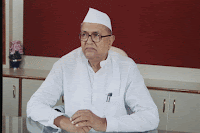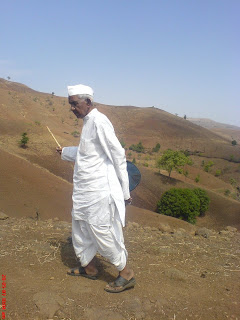Festivals of Adivasis
We Adivasis in Satpuda celebrate the ‘Indal’ festival. But in Assam our people celebrate the ‘Karam’ festival. I’ve gathered this information for you.
The Karam festival is celebrated by the Oraons on the 11th day of the Lunar month of August - September. Although the feast is meant to ensure the protection of standing crops, it is primarily the feast of unmarried girls who have been recently engaged. They pray for the blessing of healthy children. On the day of Karam all unmarried girls who want to participate in the festival keep a fast.
Karam is the most popular and important festival of the Adivasis all over India including Assam. Out of the five types of Karam celebrated at the different times of the year, which coincide with events in the agricultural cycles, 'Raji Karam' is the most popular. It is celebrated with great pomp and gaiety. The other four types of Karam are 'Gitiya Karam, Dasai Karam', 'Burhi Karam' and the 'Bamba Karam'. Karam is the name of a tree (Nauclea parvifolia ). According to the account of my informants there is a particular household in their village in whose courtyard the karam branches are planted every year for the festival. Every year the village council reminds the head of that household that the festival is approaching. Accordingly, the village messenger (Gonrait) announces the Karam Day to all the villages. The 'Raji Karam' is celebrated on 'Bhado Ekadashi' that is, on the 11th day of the Lunar month of August-September. The feast is meant for the protection of standing crops. It is primarily meant for the 'parvatins' that is the young girls who are recently engaged, who fast and pray for the healthy children in their future life. It is also believed that these ascetic practices bring down blessings upon their brothers and protect them from all harm and evil. Nevertheless, this festival is a community affair, where young and old all join in festivity. Probably, that is why it derived its name 'Raji Karam'.
The Karam festival is celebrated by the Oraons on the 11th day of the Lunar month of August - September. Although the feast is meant to ensure the protection of standing crops, it is primarily the feast of unmarried girls who have been recently engaged. They pray for the blessing of healthy children. On the day of Karam all unmarried girls who want to participate in the festival keep a fast.
Karam is the most popular and important festival of the Adivasis all over India including Assam. Out of the five types of Karam celebrated at the different times of the year, which coincide with events in the agricultural cycles, 'Raji Karam' is the most popular. It is celebrated with great pomp and gaiety. The other four types of Karam are 'Gitiya Karam, Dasai Karam', 'Burhi Karam' and the 'Bamba Karam'. Karam is the name of a tree (Nauclea parvifolia ). According to the account of my informants there is a particular household in their village in whose courtyard the karam branches are planted every year for the festival. Every year the village council reminds the head of that household that the festival is approaching. Accordingly, the village messenger (Gonrait) announces the Karam Day to all the villages. The 'Raji Karam' is celebrated on 'Bhado Ekadashi' that is, on the 11th day of the Lunar month of August-September. The feast is meant for the protection of standing crops. It is primarily meant for the 'parvatins' that is the young girls who are recently engaged, who fast and pray for the healthy children in their future life. It is also believed that these ascetic practices bring down blessings upon their brothers and protect them from all harm and evil. Nevertheless, this festival is a community affair, where young and old all join in festivity. Probably, that is why it derived its name 'Raji Karam'.



Comments